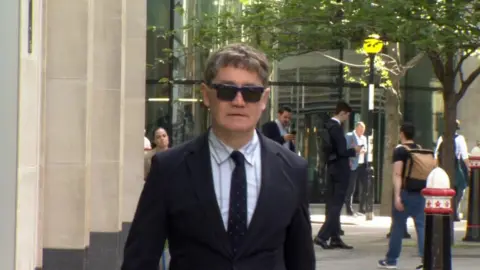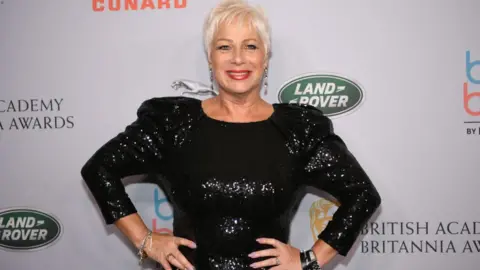Prince Harry case told MGN knew about phone hacking
 BBC
BBCA journalist previously convicted for phone hacking has told a court executives at Mirror Group Newspapers were aware of "the widespread organised crime and involved in its cover-up".
Graham Johnson told a civil trial into alleged phone hacking of Prince Harry and others how an editor asked him to bug actress Denise Welch's hotel room.
He also described buying police reports on footballer Wayne Rooney.
MGN deny senior bosses knew about the practices and failed to stop them.
It is alleged that journalists from the Daily Mirror, Sunday Mirror and The People obtained private and confidential information about people's lives through a variety of unlawful means between 1991 and 2011 - including accessing voicemail messages on their phones.
Mr Johnson, who worked as investigations editor for the Sunday Mirror between 1999 and 2005, told the High Court on the trial's sixth day that he became disillusioned at the phone hacking and bugging he was asked to do by editors.
He claimed he was told by his paper's deputy editor Mark Thomas to plant a bug while working on a story in 2001 about Denise Welch, the ex-Coronation Street actress and Loose Women panellist.
"I knew that bugging a room was a serious criminal offence and that's why I walked off the job. It's in a different league of criminality," he said.
In a written statement, he also claimed he was instructed by Mr Thomas, with the knowledge of then editor Tina Weaver, to "intercept the voicemails" of Ms Welch "because of a tip that she was in a relationship with an alleged underworld figure".
The journalist has accused a series of private investigators and photographers of using illegal bugging, phone hacking and blagging on the instructions of MGN editors and journalists.
Mr Johnson said in a written statement he was also involved in "buying sensitive police intelligence reports on targets such as Steven Gerrard and Wayne Rooney", while he said he was told of a "well-organised phone hacking conspiracy" at the Sunday Mirror, which saw the footballers Ronaldo and Rio Ferdinand targeted.
Mr Johnson pleaded guilty to phone hacking in 2014 after deciding to admit to his wrong-doing while working as a journalist. He then wrote a book about his career and began investigating unlawful information gathering by newspapers.
 Getty Images
Getty ImagesDuring cross-examination, Andrew Green KC, representing MGN, questioned Mr Johnson about a series of payments he later made to obtain evidence about wrong-doing by newspapers.
The court heard he signed a £16,000 contract with a private investigator Christine Hart, who specialised in obtaining the medical records of well-known people. She was in "dire financial straits", according to her witness statement.
The contract was for her to provide invoices proving newspapers paid for her services. But it was torn up and the money was never paid. However, some of the invoices were handed over by Ms Hart, the court was told.
Mr Johnson was challenged by Mr Green that "paying people who are vulnerable or in financial need to provide documents showing unlawful activity" could create "a real danger the material you receive will be unreliable."
Mr Johnson responded: "You can also find independent corroborative sources to stand up what these invoices are about. The reliability of the invoices is not related to the payments."
When asked by Mr Green KC if he was coming before the court as an objective and independent witness.
He replied: "I think the answer is no. I'm not objective and independent in as much as I think it's wrong for there to be organised crime at your newspaper and other newspapers.
"I write stories about it and I'm very happy to help victims of organised crime at Mirror Group."
Mirror Group Newspapers has admitted printing stories based on phone hacking and "blagging".
The current case is to decide how widespread unlawful activity was, and whether senior executives knew. The company says they did not and therefore could not have taken action to stop it.
If MGN loses the case, its parent company Reach PLC could face millions of pounds in damages claims from hundreds of alleged victims.
Prince Harry is expected to give evidence at the trial in June. He is among four people whose claims are being heard in the trial as "representative" cases of the types of allegations facing the publisher. They will also help the court set the level of damages MGN should pay if the claimants win.
Others involved are Coronation Street actors Nikki Sanderson and Michael Turner, known by his stage name Michael Le Vell, and comedian Paul Whitehouse's ex-wife Fiona Wightman.

- THE UNDERWATER CITY THAT NEVER EXISTED: Dive into the myth of Atlantis
- COULD SOLAR FARMS IN SPACE POWER EARTH?: The Climate Question considers our options

